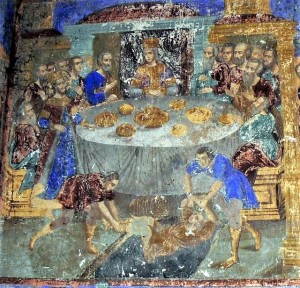The Wedding Garment – Metropolitan of Strumica, Nahum
The wedding that today’s Gospel reading tells us about (Matthew 22: 2–14) is the Kingdom of Heaven, the foretaste of which is given in the Church of Christ for those who will accept the invitation, for those who are ready, for those who have wedding garments (attire); not for those who are not capable of and are not willing to accept the invitation.
In the ascetic-hesychastic interpretation of today’s gospel reading, several moments stand out:
First, the behaviour of the invited according to their passions.
Some of them refuse the call because they go out to their fields. They are the embodiment of the passion “love of pleasures”. Those things with which they will temporarily fill their stomachs are more important to them, than the care and love that God shows to them by inviting them to the imperishable (eternal) table of the wedding of His Son in the Kingdom of Heaven.
Others who do not respond to the call are those who trade. Obviously, such ones reject God, as being enslaved by the passion of covetousness, and are the embodiment of that passion. Their god is material wealth and money.
The third group of those who were called, the ones that mocked and killed the King’s servants, are the embodiment of the passion of vainglory. As we know from the Scriptures, these are the Old Testament priesthood (the Scribes, and the Pharisees) who hand over the Lord Jesus Christ to death, but also some of the New Testament priests – the ones who kill Christ in the souls of men, fearing for their human glory, which with His presence is ultimately overshadowed (“Behold, all the people followed him …” John 12, 19). And who else might that be, but those who have high positions and authority, yet, have no inner spiritual capacity to hold down those positions?
As in the previous Gospel reading, as well as today’s Gospel reading, three main types of passions are revealed through the evangelical events before us.
They are:
- love of pleasures,
- covetousness, and,
- vainglory,
which largely determine the behaviour of the people who are enslaved by them.
The second point highlighted in this parable is that not everyone who responded to the invitation and attended, had a wedding garment.
The wedding garment symbolises the struggle of purifying the heart from the passions in obedience. Without this struggle, no one can be called a Christian. For the monks and clergy, a wedding garment is something more than that. For them, it is the gift of the prayer of the mind in the heart and the enlightenment of mind; for them, also, it is an inner spiritual capacity for the ranks (orders) they have and carry. Otherwise, how can they lead the people of God spiritually?
In the Saints, the mind, the soul, and the whole body are so much transfigured and deified that they see with their own eyes the uncreated light of God.
And the third point that is emphasized is the silence of the guest without a wedding garment.
God does not leave anyone without the possibility for salvation, even until the final moment.
When the Lord already addresses the one with no wedding garment with the word “friend” and when he already gives him the opportunity to communicate and commune with Him, it would have been appropriate for him to answer first of all, and it would have been beneficial (salvific) to say, “forgive me”. But the one who has not done anything to acquire a wedding garment, in other words, has not done anything to build a personal relationship with the Lord, will have no experience nor learning as to how to answer and how to handle that crucial moment.
And what may a Bishop answer, the one, who, instead of leading the people to the Kingdom of Heaven and instead of caring for the unity of the Church, preaches nationalism and implements state policies into the inter-church relations?
“Then the King said to the servants, ‘Bind him hand and foot, take him away, and cast him into outer darkness; there will be weeping and gnashing of teeth. For many are called, but few are chosen.’”
Most Holy Theotokos, save us!
Metropolitan of Strumica, Nahum
(25.09.2021 15:59)

